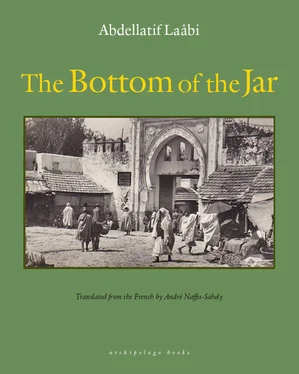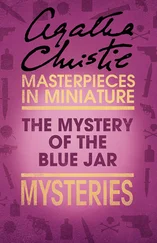“Let me taste the harira,” Namouss implored, his stomach howling like a wolf.
Ghita filled half a bowl. Namouss gulped it down and asked for more.
“Fill the whole bowl.”
“So? Is it salty enough?”
Not paying any attention to these nuances, he dodged the question gracefully: “Your soup knows no rival.”
Flattered by the compliment, Ghita uncovered a dish filled with honey cakes and said, “Take as many as you like. Eat, eat. At least your life is carefree. What happiness!”
Pondering as he ate, Namouss felt reassured. If he was ever punished, it would be for running away rather than for the mischief he’d caused earlier in the morning; nevertheless, he wanted to make sure. Recklessly, he asked, “And the mice?”
“What mice?”
“The ones that came out of the cupboard this morning. Did you kill them?”
“Hush now! They managed to get away. Wanting to crush them with the cudgel, your father missed his mark and wound up almost breaking my leg. But how did you know they came out of the cupboard, where you there or what?”
“No, Yemma, I swear.”
“Don’t swear. If you lie, you’ll turn into a monkey. Watch yourself. Now finish your cake and go to the ovens to bring back the bread. There are five big loaves and a small one, which I seasoned with sesame and aniseed. You see, I was thinking about you. Here’s the money for the baker. Make sure you hold on to it tightly so it won’t drop or get stolen. Go on, get going. The men will be back and the Maghrib will soon be called.”
Namouss found the whole family around the table when he came back from the ovens. Ghita had already poured the soup and laid out various plates filled with honey cakes, dates, and dried figs. With only a few minutes to go before the announcement of the breaking of the fast, faces wore sullen looks. Everyone stared at the food in silence, ears open. Finally the cannon sounded and the call of the muezzin filled the air.
“ Bismillah ,” Driss began.
Everyone lapped up their first bowl of harira, grunting with pleasure and smacking their lips. By the time the second bowl was served, the atmosphere had relaxed noticeably. Namouss decided to take advantage of the lull to make his move. The idea he had devised to pull the rug out from under Driss’s feet was daring.
“I fasted today,” he declared in a cocky way.
“You did, well at least until the middle of the afternoon.” Ghita corrected him, a smile forming on the corner of her lips. “You’ll do better some other day.”
“And where were you until then?” Driss inquired, clearly irritated.
“I was playing outside with my friends,” Namouss replied foolishly.
“Since when did you play in the Sekkatine, and all by yourself? The watchman at the souk told me all about it. You’ve become a chitane — a devil — you have. So finish up and get out of my sight. The soles of your feet deserve a sound thrashing.”
Namouss kept quiet. He knew that Driss’s threats were not to be taken at face value. At most, they expressed an anger that would abate as soon as he had finished his meal. The nightmare had therefore come to an end, and all things considered, he hadn’t done too badly. He was the first to leave the table.
HE RAN INTO a few of his friends while out on the street: Hat Roho, his blond, blue-eyed classmate; Hammad, who was such a cranky, snot-nosed crybaby he was barely tolerated by the gang; Loudini, who had the look of an outlaw about him and was by far the most cunning and always had a devilish idea running through his mind; and finally, Belhaj, who with his milk-white skin looked like a little old man, and whose head was even rounder than the rag balls with which they played.
Emboldened by his earlier feats, Namouss suggested the gang play a match of taïba (blindman’s buff). But Loudini, who didn’t want anyone to steal his thunder, was in favor of a riskier game: tafriq Nsara (doing splits like the Nazarenes). Hammad, who was not suited for gymnastics, campaigned for something a little more conventional: seb sebbout (leapfrog). Not wanting to remain on the sidelines, Hat Roho suggested a whirligig tournament. The debate got heated and threatened to result in everyone going their separate ways, at which point Belhaj, who was usually shy, put forward a compromise: They would begin with a race and then proceed to the other games. The great overlord Loudini gave his consent, thereby ensuring the others would follow suit. Only Hammad complained, and though he began to snivel and did not want to participate in the race, he agreed to organize the teams. He suggested that Namouss, against whom he held a grudge, would face the formidable Loudini, which left Hat Roho to race against Belhaj. And of course it was only logical that Hammad also act as referee.
It was on. The starting line: the middle of the square in the Spring of Horses. The two runners stood back to back. When the referee waved them off, they would dash in opposite directions: one on the left, the other on the right. The one on the left would go down Aïn Allou, climb the Tamisiers hill, go down rue Bouaâqda, tear down rue Ben Debbouz, and once there make his entry into the neighborhood. The one on the right would follow the same course, except in the opposite direction. Cheating wasn’t an option because the adversaries had to cross paths eventually. It would also provide a good opportunity to determine whether one was ahead or lagging behind. The next step: a final that would pit the winner of the first race against the winner of the second.
One can easily guess that, on that evening, Namouss lost the first race. Thanks to his day’s wanderings around the Medina and his blitz through to the Jnan Sbil gardens — coupled with his opponent’s sturdiness — it couldn’t have ended any other way. After a decisive defeat over Namouss, Loudini didn’t have any trouble beating Hat Roho, who’d initially had it easy with Belhaj.
The night wore on. A great many people had left their houses and the neighborhood to see what was happening elsewhere. Driss had been among the first, heading toward the Sekkatine to get back to work and later to join a late-night card game. The workshops in the Spring of Horses came back to life. Those in Ahl Touat that belonged to fine-leather craftsmen originally from the Sahara reverberated with songs accompanied by clapping. Namouss had never dared venture into the area. People from Touat were generally considered foreigners and were therefore kept at arm’s length. Yet their songs, though different from those usually performed in Fez, were of a rare beauty.
Namouss’s gang had run out of games to play. They stumbled into a character who was particularly fond of their company. Si Abdeltif was one of the few adults in the neighborhood who didn’t look down on children and was always willing to exchange a few words with them. Even though he belonged to a large sharif family, he didn’t seem to share any of their traits and was quick to speak his mind. In terms of his physique, the man was visibly corpulent. His ample djellaba didn’t quite manage to conceal a belly that, considering he was barely in his forties, was exceptionally large and forced him to use a cane in order to get about. Perhaps that explained why he was so fond of sitting on that stone bench in the middle of the lane and holding court for hours on end. Si Abdeltif’s family was one the neighborhood’s most influential and owned a great number of properties in the area. They also owned vast stretches of land in the surrounding countryside. Donkeys bearing the produce of these estates would often show up in the neighborhood. Their panniers would be heaving with sacks of wheat, olives, figs, and grapes. Whenever the produce was being unloaded, Namouss and his gang would take advantage of the situation and pocket anything that fell to the wayside: a handful of fresh figs or a generous bunch of grapes. His family’s wealth hadn’t gone to Si Abdeltif’s head, and he seemed to prefer mixing with more humble people — completely unlike his arrogant elder brother, who terrified the children. As soon as this brother came into view, the children would break up their game to clear the way for him. If they happened to be playing soccer, they would quickly pick up the ball lest he confiscate it, deaf to all their entreaties. It was surely Si Abdeltif’s sense of humor that had saved him from winding up like his elder brother. And he would make the most of it. Whether he recounted anecdotes or put forward facetious interpretations of dreams, it was evident that he gave in to the lighter, rosier side of life. Whenever he arrived, panting, easing his bulk down onto the stone bench, the first words he uttered usually set the tone for what was to come.
Читать дальше












